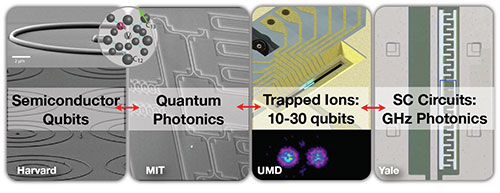The rules of quantum mechanics enable technologies that are inherently more powerful than their classical counterparts, including unconditionally secure communication, quantum computing, and quantum-enhanced precision sensing. Translating quantum technologies to room-temperature semiconductor systems is key to making them practical and scalable. However, a central challenge is the need for fundamentally improved quantum measurement and state verification (QMSV) techniques to overcome major limitations of today’s theoretical and experimental tools. The goal of this program is to establish general and optimal QMSV protocols to solve the challenges. The program seeks to develop essential measurement-based algorithmic primitives that form an efficient, unifying language for quantum algorithms.

Experiments focus on leading quantum architectures. Recent advances in QMSV, such as compressive sensing or ancilla-assisted tomography, have been shown to offer dramatic improvements in quantum information processing applications. A major focus is on scale-up of room-temperature, semiconductor quantum systems. However, such research can be complicated by the complex mesoscopic environment in semiconductors (especially in ambient conditions) or the short coherence time and weak interaction of photons. These issues will be addressed in semiconductor and quantum photonic systems, as well as advanced trapped ions and superconducting circuit architectures.
Major goals of this program include room-temperature semiconductor quantum memories with minutes-long quantum memories; versatile field-programmable quantum photonic integrated circuits; high-sensitivity nanometer-scale magnetic field probes; advanced optical imaging systems; physically secure high-capacity communications to augment classical communications; and quantum algorithms for solving and simulating classically hard problems.
Supported by the Air Force Office of Scientific Research

